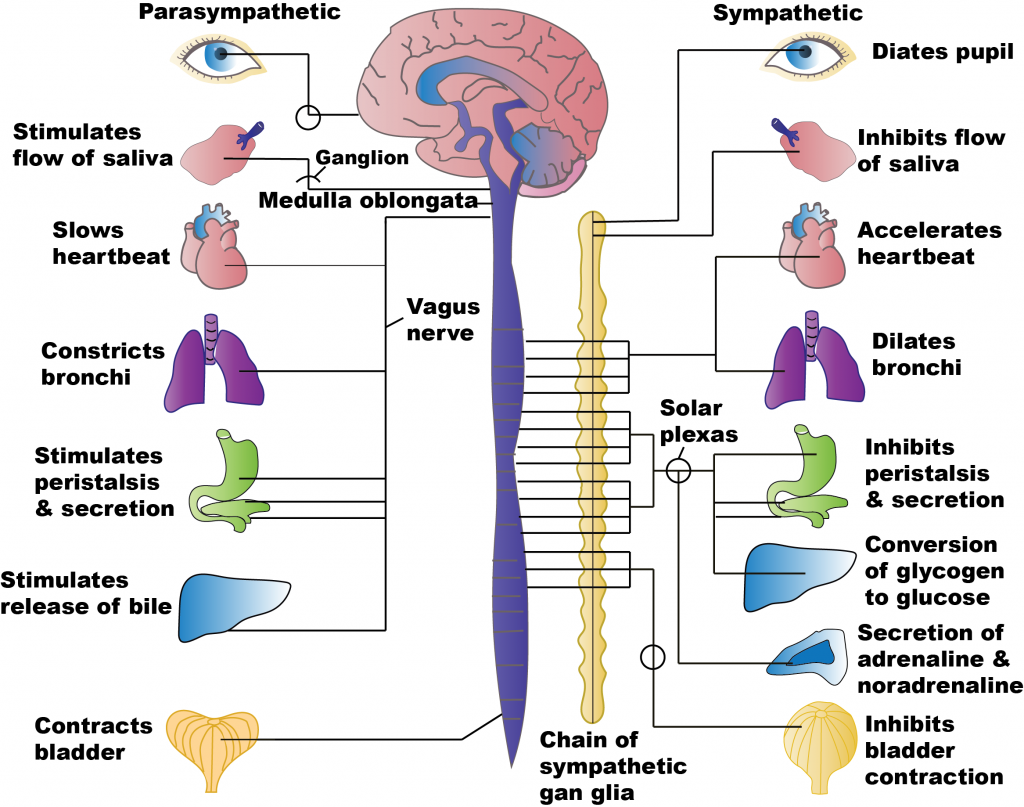Sympathetic nervous system (SNS) activation can change these body functions except:
Increase heart rate
Increase blood glucose
Increase GI motility and movement
Increase blood pressure
The Correct Answer is C
Choice A Reason:
The sympathetic nervous system (SNS) is responsible for the “fight or flight” response, which prepares the body to respond to perceived threats. One of the primary effects of SNS activation is an increase in heart rate. This is achieved through the release of catecholamines like adrenaline, which stimulate the heart to pump more blood to vital organs and muscles.
Choice B Reason:
Another effect of SNS activation is an increase in blood glucose levels. This occurs because the body needs more energy to respond to stress. The SNS stimulates the liver to release glucose into the bloodstream, ensuring that muscles and other tissues have enough energy to function effectively during a stressful situation.
Choice C Reason:
The correct answer is that SNS activation does not increase GI motility and movement. In fact, it has the opposite effect. During a “fight or flight” response, the body prioritizes functions that are critical for immediate survival, such as increased heart rate and blood flow to muscles. As a result, non-essential functions like digestion are slowed down. The SNS decreases GI motility and movement to divert energy and blood flow to more critical areas.
Choice D Reason:
SNS activation also leads to an increase in blood pressure. This is achieved by constricting blood vessels and increasing the force of heart contractions. The purpose of this response is to ensure that enough blood and oxygen are delivered to essential organs and muscles during a stressful situation.

Nursing Test Bank
Naxlex Comprehensive Predictor Exams
Related Questions
Correct Answer is C
Explanation
Choice A: Hypoventilation
Hypoventilation refers to inadequate ventilation that leads to an increased concentration of carbon dioxide (CO2) in the blood, resulting in respiratory acidosis. This condition is characterized by a decrease in blood pH due to the accumulation of CO2, which forms carbonic acid. Hypoventilation does not cause metabolic acidosis, as it primarily affects the respiratory component of acid-base balance.
Choice B: Massive Blood Transfusion
Massive blood transfusion can lead to metabolic alkalosis rather than metabolic acidosis. This is because stored blood products often contain citrate, which is metabolized to bicarbonate in the liver, increasing the blood’s alkalinity. Additionally, the transfusion of large volumes of blood can dilute the plasma bicarbonate concentration, but this typically does not result in metabolic acidosis.
Choice C: Kidney Failure
Kidney failure is a common cause of metabolic acidosis. The kidneys play a crucial role in maintaining acid-base balance by excreting hydrogen ions (H+) and reabsorbing bicarbonate (HCO3-). When the kidneys fail, they are unable to remove sufficient acids from the blood, leading to an accumulation of metabolic acids and a decrease in blood pH. This condition is known as metabolic acidosis and can result from chronic kidney disease (CKD) or acute kidney injury (AKI).
Choice D: Hyperventilation
Hyperventilation leads to respiratory alkalosis, not metabolic acidosis. This condition occurs when there is excessive ventilation, causing a decrease in CO2 levels in the blood and an increase in blood pH. Hyperventilation reduces the concentration of carbonic acid, leading to an alkaline state. It does not contribute to metabolic acidosis, which involves an imbalance in the metabolic components of acid-base regulation.
Correct Answer is B
Explanation
Choice A Reason:
Tertiary prevention involves measures taken to reduce the impact of an ongoing illness or injury that has lasting effects. This includes rehabilitation and efforts to prevent further complications or deterioration. Vaccination, however, is aimed at preventing the disease before it occurs, which does not align with the concept of tertiary prevention.
Choice B Reason:
Primary prevention refers to actions taken to prevent the onset of disease before it occurs. Vaccination is a classic example of primary prevention because it aims to protect individuals from contracting diseases by stimulating the immune system to recognize and fight specific pathogens. In this case, the meningococcal vaccine helps prevent meningitis, making it a primary preventive measure.
Choice C Reason:
Disease treatment involves managing and caring for a patient to combat a disease or condition. This includes interventions aimed at curing the disease, alleviating symptoms, or preventing complications. Vaccination does not fall under disease treatment because it is a preventive measure rather than a therapeutic one
Choice D Reason:
Secondary prevention focuses on early detection and prompt intervention to prevent the progression of a disease. This includes screening tests and early treatment of conditions to halt or slow their progression. Vaccination, however, is intended to prevent the disease from occurring in the first place, which is not the goal of secondary prevention.
Whether you are a student looking to ace your exams or a practicing nurse seeking to enhance your expertise , our nursing education contents will empower you with the confidence and competence to make a difference in the lives of patients and become a respected leader in the healthcare field.
Visit Naxlex, invest in your future and unlock endless possibilities with our unparalleled nursing education contents today
Report Wrong Answer on the Current Question
Do you disagree with the answer? If yes, what is your expected answer? Explain.
Kindly be descriptive with the issue you are facing.
